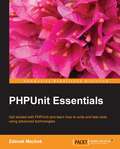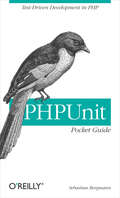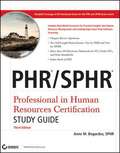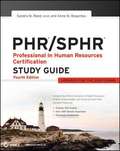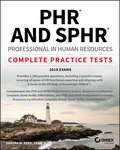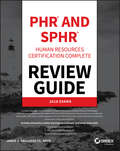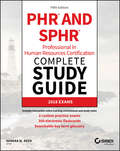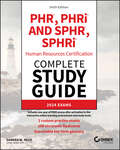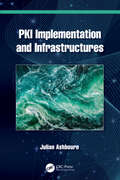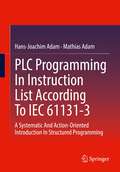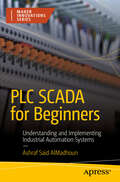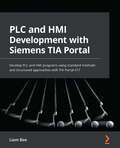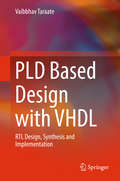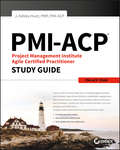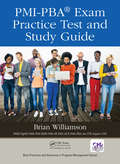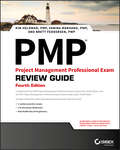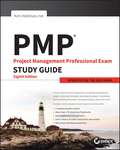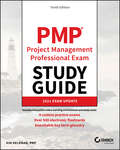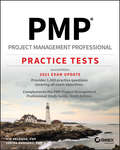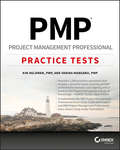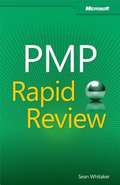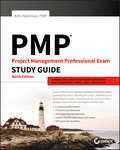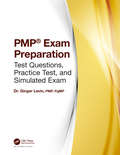- Table View
- List View
PHPUnit Essentials
by Zdenek MachekThis book is a practical guide featuring a step-by-step approach that aims to help PHP developers who want to learn or improve their software testing skills. It also takes you through many reallife examples encountered by PHP developers to help you avoid common pitfalls. This book is a practical guide featuring a step-by-step approach that aims to help PHP developers who want to learn or improve their software testing skills. It also takes you through many reallife examples encountered by PHP developers to help you avoid common pitfalls.
PHPUnit Pocket Guide: Test-Driven Development in PHP
by Sebastian BergmannSmart web developers will tell you that the sooner you detect your code mistakes, the quicker you can fix them, and the less the project will cost in the long run. Well, the most efficient way to detect your mistakes in PHP is with PHPUnit, an open source framework that automates unit testing by running a battery of tests as you go. The benefits of PHPUnit are significant:a reduction in the effort required to frequently test codefewer overall defectsadded confidence in your codeimproved relations with your open source teammates The only problem with this popular testing tool was its lack of documentation-until now, that is. For this, O'Reilly went right to the source, as Sebastian Bergmann, the author of PHPUnit Pocket Guide, also happens to be PHPUnit's creator. This little book brings together hard-to-remember information, syntax, and rules for working with PHPUnit. It also delivers the insight and sage advice that can only come from the technology's creator. Coverage of testing under agile methodologies and Extreme Programming (XP) is also included. The latest in O'Reilly's series of handy Pocket Guides, this quick-reference book puts all the answers are right at your fingertips. It's an invaluable companion for anyone interested in testing the PHP code they write for web applications.
PHR / SPHR Professional in Human Resources Certification Study Guide
by Anne M. BogardusMore than 80,000 HR professionals having earned the Senior Professional in Human Resources (SPHR) or Professional in Human Resources (PHR) certification, and another 20,000 are expected to take the exam in 2009. This complete update of the bestselling guide to HR certification contains additional coverage of new HR policies and standards, as well as updated practice exam questions and real world scenarios. Key topics include strategic management, workforce planning and employment, compensation and benefits, employee and labor relations, and Occupational Safety and Health Administration (OSHA) regulations. The CD-ROM contains two bonus exams (one each for PHR and SPHR) as well as flashcards and an electronic book.Note: CD-ROM/DVD and other supplementary materials are not included as part of eBook file.
PHR / SPHR Professional in Human Resources Certification Study Guide
by Anne M. Bogardus Sandra M. ReedUpdated edition of best-selling guide for PHR and SPHR candidates The demand for qualified human resources professionals is on the rise. The new Professional in Human Resources (PHR) and Senior Professional in Human Resources (SPHR) exams from the Human Resources Certification Institute (HRCI) reflect the evolving industry standards for determining competence in the field of HR. This new edition of the leading PHR/SPHR Study Guide reflects those changes. Serving as an ideal resource for HR professionals who are seeking to validate their skills and knowledge, this updated edition helps those professionals prepare for these challenging exams. Features study tools that are designed to reinforce understanding of key functional areas Provides access to bonus materials, including a practice exam for the PHR as well as one for the SPHR. Also includes flashcards and ancillary PDFs Addresses key topics such as strategic management, workforce planning and employment, compensation and benefits, employee and labor relations, and Occupational Safety and Health Administration regulations This new edition is must-have preparation for those looking to take the PHR or SPHR certification exams in order to strengthen their resume.
PHR and SPHR Professional in Human Resources Certification Complete Practice Tests: 2018 Exams
by Sandra M. Reed1,000 challenging practice questions to prepare for the PHR and SPHR exams! PHR/SPHR Professional in Human Resources Certification Practice Tests is the ideal complement to the PHR/SPHR Study Guide, Fifth Edition, PHR/SPHR Deluxe Study Guide, Second Edition, and Review Guide. These self-study guides are intended for HR professionals seeking to validate their skills and knowledge acquired through years of practical experience, or for relative newcomers to the HR field looking to strengthen their resume. These Practice Tests were developed to help certification candidates prepare for these challenging exams, especially for those needing more practice to review or refresh their knowledge right before exam day. The book aligns with A Guide to the Human Resource Body of Knowledge™ (HRBoK™), which details the responsibilities of and knowledge needed by today's HR professionals. Practice Tests reflect the critical HR topics that you need to understand as you prepare for the PHR and SPHRexams. • Business Management and Strategy • Workforce Planning and Employment • Human Resource Development • Risk Management and more Plus, you’ll get a year of FREE access to the interactive online learning environment and test bank, which includes full-length tests and practice exams—1,000 practice questions total!
PHR and SPHR Professional in Human Resources Certification Complete Review Guide: 2018 Exams
by James J. Galluzzo IIIEssential review for the PHR/SPHR exams, aligned with the updated HRBoK™ PHR/SPHR Professional in Human Resources Certification Review Guide is the ideal companion to the PHR/SPHR Study Guide, Fifth Edition, and PHR/SPHR Deluxe Study Guide, Second Edition. These self-study guides are intended for HR professionals seeking to validate their skills and knowledge acquired through years of practical experience, or for relative newcomers to the HR field looking to strengthen their resume. Organized by those areas of knowledge and practices specific and necessary to human resource management (HRM), this handy review guide covers tasks, processes, and strategies as detailed in the updated A Guide to the Human Resource Body of Knowledge™ (HRBoK™), giving you clear guidance on what you need to know for the exams. You also get a year of FREE access to the Sybex online interactive learning environment and study tools, which feature flashcards, chapter tests, two bonus practice exams, and more. The review guide aligns with the HRCI test specifications, which detail the responsibilities and knowledge needed by today's HR professionals. Covers key functional areas in greater depth: HR students and professionals studying for the PHR/SPHR certification need a trusted resource to aid in their preparation—this review guide does that and more.
PHR and SPHR Professional in Human Resources Certification Complete Study Guide: 2018 Exams
by Sandra M. ReedThe #1 book for the leading HR certifications, aligned with the updated HRBoK™ PHR and SPHR certifications, offered by Human Resources Certification Institute (HRCI), have become the industry standard for determining competence in the field of human resources. Developed by working professionals, the PHR and SPHR credentials demonstrate that recipients are fully competent HR practitioners based on a standard set by workforce peers. Offering insights into those areas of knowledge and practices specific and necessary to human resource management (HRM), this study guide covers tasks, processes, and strategies as detailed in the updated A Guide to the Human Resource Body of Knowledge™ (HRBoK™). The study guide breaks down the critical HR topics that you need to understand as you prepare for the exams. PHR/SPHR Professional in Human Resources Certification Study Guide, Fifth Edition, is the ideal resource for HR professionals seeking to validate their skills and knowledge acquired through years of practical experience, as well as for a relative newcomer to the HR field looking to strengthen their resume. In this edition of the top-selling PHR/SPHR study guide, you’ll find a practical review of all topics covered on the exams, as well as study tools designed to reinforce understanding of key functional areas. Strengthen the skills you learn with a year of FREE access to the Sybex online learning environment, complete with flash cards and practice quizzes to prepare you for exam day. • Business Management and Strategy • Workforce Planning and Employment • Compensation and Benefits • Human Resource Development and more If you’re preparing for these challenging exams, this is the trusted study guide that’ll help you perform your best.
PHR, PHRi and SPHR, SPHRi Human Resources Certification Complete Study Guide: 2024 Exams (Sybex Study Guide)
by Sandra M. ReedPrepare for the updated 2024 PHR, PHRi and SPHR, SPHRi certification exams smarter and faster with this Sybex Study Guide The newly revised sixth edition of the PHR, PHRi and SPHR, SPHRi Human Resources Certification Complete Study Guide: 2024 Exams is the ideal resource for HR professionals seeking to validate their skills and knowledge acquired through years of practical experience or for a relative newcomer to the HR field looking to strengthen their resume. The new edition of the bestselling PHR and SPHR Study Guide reflects the recently updated A Guide to the Human Resource Body of Knowledge—HRBoK—and is written to help you prepare for these challenging exams. The Study Guide walks you through the seven key functional areas of the PHR/PHRi and five key functional areas of the SPHR/SPHRi that are covered in the exams, including business management and strategy, leadership, workforce planning, talent acquisition and talent management, learning and development, total rewards, employee engagement, employee and labor relations, and the most recently added, HR information management. You'll also find: Up-to-date and incisive guidance on topics you'll use every day in your existing or next HR role Updates reflecting the latest additions to both the US and International versions of the exams, including the incorporation of DE&I concepts and cybersecurity needs Complimentary access to Sybex's outstanding online learning environment and test bank, including hundreds of practice test questions, electronic flashcards, and a glossary of key terms Perfect for aspiring and established human resources professionals preparing for the 2024 PHR, PHRi and SPHR, SPHRi certification exams, this Study Guide is also an essential volume for practicing HR professionals seeking to brush up on key, on-the-job skills they'll use each day.
PICTURING QUANTUM PROCESSES: A First Course in Quantum Theory and Diagrammatic Reasoning
by Bob Coecke Aleks KissingerThe unique features of the quantum world are explained in this book through the language of diagrams, setting out an innovative visual method for presenting complex theories. Requiring only basic mathematical literacy, this book employs a unique formalism that builds an intuitive understanding of quantum features while eliminating the need for complex calculations. This entirely diagrammatic presentation of quantum theory represents the culmination of ten years of research, uniting classical techniques in linear algebra and Hilbert spaces with cutting-edge developments in quantum computation and foundations. Written in an entertaining and user-friendly style and including more than one hundred exercises, this book is an ideal first course in quantum theory, foundations, and computation for students from undergraduate to PhD level, as well as an opportunity for researchers from a broad range of fields, from physics to biology, linguistics, and cognitive science, to discover a new set of tools for studying processes and interaction.
PKI Implementation and Infrastructures
by Julian AshbournThe concept of a PKI (public key infrastructure) has been around for decades, but it is one strand of IT which has taken an extraordinarily long time to come to fruition within the mainstream. This is mostly because implementing a PKI is time consuming and difficult. Maintaining a PKI is equally time consuming and even more difficult within the real world of mergers and acquisitions against a backdrop of ever-changing technology. Many organisations simply give up and hand everything over to a third party who promises to manage everything on their behalf. This is generally not a good idea and simply delays the inevitability of failures and misunderstood complexity. This book explores all the aspects of implementing and maintaining a PKI that the other books on the subject seem to miss. It reflects decades of hard-won experience, not only in PKI, not only in IT, not only in electronics, but in business, government agencies and academia alike. The book also explores the existence of a PKI alongside other technologies, such as biometrics, and against an ever-changing world of development methodologies. This last point is particularly relevant at this time as we are in the middle of a quiet, but all encompassing revolution in this respect. Consequently, this is the one book on PKI that you have to have on your shelf, whether you be a company director, IT manager, government minister or teacher of IT. It is the book which fills in all the gaps left in the literature and treads paths which others fear to tread. You will enjoy it enormously if you are from an IT background.
PLC Programming In Instruction List According To IEC 61131-3: A Systematic And Action-Oriented Introduction In Structured Programming
by Hans-Joachim Adam Mathias AdamThis textbook and exercise book provides a solid basic knowledge and comprehensive practical skills in dealing with PLC programming. Numerous exercises help to deepen the material. With the accompanying simulation software and sample solutions, the acquired knowledge can be applied immediately. The software can be downloaded via the Internet. The knowledge of number systems and digital technology conveyed in the book is an important prerequisite for skilful and clever PLC programming. The programming language used, "Instruction list according to IEC 61131-3", provides the best insights into the functioning of a PLC. The didactically prepared programming examples for switching networks, signal memories, time functions, counters, function blocks and functions, program structures, sequence controls, data types and much more enable systematic learning of programming. The 5th, corrected edition experiences an expansion of the exercises with a didactically prepared project for the control of a mountain railway. The associated simulation software "PLC-lite" enables the realisation of controls for the mountain railway and the "realistic" representation of the cableway movements on the screen.
PLC SCADA for Beginners: Understanding and Implementing Industrial Automation Systems (Maker Innovations Series)
by Ashraf Said AlMadhounThis book provides a thorough introduction to the fundamental concepts and technologies of Programmable Logic Controllers (PLCs) and Supervisory Control and Data Acquisition (SCADA) systems. It is designed for beginners and those new to the field, offering a clear and concise overview of the basics of PLCs, SCADA systems, and their applications in various industries. The book covers key components of PLCs and SCADA systems, including programming languages and communication methods, and provides practical tips and techniques for troubleshooting and maintenance. With numerous examples and exercises, this book offers hands-on experience for readers to deepen their understanding of these concepts and technologies. What You'll Learn The fundamentals of PLC and SCADA systems. How to install, program, maintain, and troubleshoot these systems Real-world applications and how to implement these technologies effectively. Who Is This Book For This book is intended for electrical and control engineers, automation technicians, students, and educators in fields such as electrical engineering, control systems, and automation. Industry professionals from various sectors such as manufacturing, oil and gas, water and wastewater treatment, power generation, and distribution will also find this book useful.
PLC and HMI Development with Siemens TIA Portal: Develop PLC and HMI programs using standard methods and structured approaches with TIA Portal V17
by Liam BeeBecome well-versed with the tools available in the Siemens TIA toolbox and write PLC and HMI code effectivelyKey FeaturesFind out how to use TIA Portal effectively to boost your productivityLearn about a structured design pattern and understand why it is so powerful when implemented correctlyDiscover efficient project management and design practicesBook DescriptionWith automation requirements on the rise, Siemens' TIA Portal development environment is almost a necessity for any automation engineer. The Totally Integrated Automation (TIA) environment helps seamlessly integrate all things automation, from PLC hardware and software design to HMI development. This book helps you understand the tools available in the TIA toolbox and shows you how to write code effectively.The book begins by introducing you to the TIA environment, covering the layout and tools available. Once you've got to grips with the environment, you'll find out how to create hardware to write programs against, including adding IO modules and assigning memory for input and output. Next, you'll develop logic in all of the languages that TIA Portal offers, such as Ladder, Function Block Diagram, and Structured Text (SCL) (note that Statement List is not covered as a deprecated language), as well as the newest language, Cause and Effect (CEM). You'll also discover how to store standard code in libraries, creating a version control system that is easy to manage and aids standard design. Finally, following the PLC design chapters, you'll learn how to develop HMI applications in TIA Portal's latest unified hardware.By the end of the book, you'll be well equipped to use all of the features that TIA Portal V17 offers.What you will learnSet up a Siemens Environment with TIA PortalFind out how to structure a projectCarry out the simulation of a project, enhancing this further with structureDevelop HMI screens that interact with PLC dataMake the best use of all available languagesLeverage TIA Portal's tools to manage the deployment and modification of projectsWho this book is forThis TIA Portal book is for anybody looking to learn PLC/HMI development using the latest Siemens development platform. Industrial software engineers, PLC engineers, automation engineers, and electricians will be able to advance their skill set with this guide. A basic understanding of PLC principles such as PLC data types and basic objects such as function blocks and functions is necessary to get started.
PLD Based Design with VHDL
by Vaibbhav TaraateThis book covers basic fundamentals of logic design and advanced RTL design concepts using VHDL. The book is organized to describe both simple and complex RTL design scenarios using VHDL. It gives practical information on the issues in ASIC prototyping using FPGAs, design challenges and how to overcome practical issues and concerns. It describes how to write an efficient RTL code using VHDL and how to improve the design performance. The design guidelines by using VHDL are also explained with the practical examples in this book. The book also covers the ALTERA and XILINX FPGA architecture and the design flow for the PLDs. The contents of this book will be useful to students, researchers, and professionals working in hardware design and optimization. The book can also be used as a text for graduate and professional development courses.
PMI-ACP Project Management Institute Agile Certified Practitioner Exam Study Guide
by J. Ashley HuntThe ultimate study package for the new PMI-ACP exam The PMI-ACP Project Management Institute Agile Certified Practitioner Exam Study Guide is an all-in-one package for comprehensive exam preparation. This up-to-date guide is fully aligned with the latest version of the exam, featuring coverage of 100 percent of the exam domains. Expanded coverage of AGILE includes the basic principles, value-driven delivery, stakeholder engagement, team performance, adaptive planning, problem detection and resolution, and continuous improvement to align with the A Guide to the Project Management Body of Knowledge (PMBOK® 6th Edition) and its increased emphasis on agile, adaptive and iterative practices. In-depth discussion merges with hands-on exercises and real-world scenarios to provide a well-rounded review of essential exam concepts, while the online learning center provides an assessment test, chapter tests, a practice exam, and study aids to help you ensure complete preparation for the big day. Master 100 percent of the exam objectives, including expanded AGILE coverage Reinforce critical concepts with hands-on practice and real-world scenarios Test your knowledge with challenging chapter review questions One year of FREE access to the Sybex online test bank featuring practice tests, flashcards, a glossary, and more Project management is one of the most in-demand skills in today's job market, making more and more employers turn to AGILE methodologies to enhance delivery and results. The PMI-ACP certification shows employers that you have demonstrated mastery of essential project management skills and a practical understanding of adaptive, iterative processes; this validation puts you among the ranks of qualified project management professionals employers are desperately seeking, and the PMI-ACP Project Management Institute Agile Certified Practitioner Exam Study Guide is your one-stop resource for exam success.
PMI-PBA® Exam Practice Test and Study Guide (Best Practices in Portfolio, Program, and Project Management)
by Brian WilliamsonThe PMI-PBA® Exam Practice Test and Study Guide attempts to address all your questions and concerns by providing two of the most sought-after study aids: memory maps and practice questions. The systematic use of memory maps helps aid in the efficient recall of information and can boost confidence during the exam. Well-crafted practice questions are fantastic study aids that can be used to track your progress as you learn new concepts, introduce you to the complex sentence structure that is likely to appear on the exam, and concentrate your studies by domain, essentially preparing you to pass the very challenging PMI-PBA® Exam in the allotted four hours. <P><P>In addition to study hints and exam topics, this book provides references to tools and techniques that should be incorporated into your work immediately. For each of the five domains outlined in the PMI Professional in Business Analysis (PMI-PBA)® Examination Content Outline 2013 (the ECO), twenty practice questions test your knowledge. Also included is a challenging 200-question practice exam, which is representative of the actual exam. <P><P>To enhance your studies, a timed, online simulated exam is also provided. At the end of the simulated exam, you can see your score per the number of questions you answered correctly. These exam questions are crafted to foster learning and reinforce content; they are not obscure or overly complicated, but rather are representative of the actual exam. <P><P>Knowing what to do must be translated into doing what you know. This book helps you prepare for the PMI-PBA® exam by instilling knowledge and encouraging critical thinking. As a result, the skills attained can lead to improved project success and outcomes, and you’ll have a much stronger understanding of the material, along with the tools and techniques of business analysis. PMI-PBA® is a registered trademark of the Project Management Institute.
PMP Exam Challenge!: 600 Mind-bending, Thought-provoking Questions For Pmp Exam Preparation (Esi International Project Management Ser. #15)
by Ginger Levin J. LeRoy WardPreparing for and passing the PMP(R) exam is no small feat. Although the number of certified PMP(R)s continues at a phenomenal rate, the exam failure rate remains uncommonly high. PMP(R) Exam Challenge! is designed to help you pass the exam by giving you an easy-to-use, highly portable publication, containing key relevant topics you are certain to
PMP Project Management Professional Exam Review Guide
by Kim Heldman Vanina Mangano Brett FeddersenEssential review for the PMP exam, updated for the new PMBOK® Guide, 6th edition The PMP Project Management Professional Exam Review Guide, Fourth Edition, offers complete, concise review of essential project management concepts and practices. Covering 100% of the PMP exam objectives, this book helps you ensure your full preparation in advance of the big day. This new 4th Edition has been updated to align with the newest version of the exam, featuring changes to PMP best practices, greater emphasis on Agile and other iterative processes, as well as the evolution of the project manager's role. Organized by domain area, this handy review guide covers project initiation, planning, execution, monitoring, and closing as detailed in the new A Guide to the Project Management Body of Knowledge (PMBOK® Guide), 6th Edition, giving you clear guidance on what you need to know for the exam. You also get a year of free access to the Sybex online interactive learning environment and study tools, which features flashcards, chapter tests, two bonus practice exams, and more. PMP candidates must have extensive project management experience before taking the exam, but you cannot rely on experience alone; the PMP exam tests your understanding of critical PMP concepts and practices as laid out in the PMBOK® Guide 6th Edition; this practical review condenses the PMBOK's essential details into quickly-digestible chapters that help you prepare more efficiently. Review 100% of the exam objectives Apply PMP concepts to real-world scenarios Identify areas in need of additional review Access practice exams, flashcards, and more The PMP certification puts you in demand, and can be a major boost to your career. Regardless of your current level of experience, exam success lies in complete and thorough preparation; the PMP Project Management Professional Exam Review Guide, Fourth Edition, is your ultimate key to confidence and success.
PMP Project Management Professional Exam Study Guide
by Kim HeldmanThe much-anticipated update to the highly acclaimed PMP study guide!The Project Management Profressional (PMP) certification is the most desired skill in today's IT marketplace and candidates are required to have thousands of hours of PM experience even before taking the PMP exam.This fifth edition is completely updated for the newest exam and is the most comprehensive review guide on the shelf. You'll benefit from the detailed discussions on a wide range of PMP topics, concepts, and key terms-all of which cover the Project Management Process and Procedures.A comprehensive study guide for the PMP certification exam that can also be used as a reference after the exam Each chapter covers a list of objectives, followed by in-depth discussions of those objectives Includes hands-on, real-world scenarios to prepare you for the many situations you may face on the job Companion CD-ROM features a test engine of practice questions, electronic flashcards, and two hours of audio Essential reading both before and after the PMP exam, this study guide is also aimed at anyone studying for the new Certified Associate in Project Management (CAPM) program.Note: CD-ROM/DVD and other supplementary materials are not included as part of eBook file.For Instructor: Teaching supplements are available for this title.
PMP Project Management Professional Exam Study Guide: 2021 Exam Update
by Kim HeldmanPrepare for PMP certification exam success with this fully updated and comprehensive study guide This study guide serves as a comprehensive resource for those who plan on taking the Project Management Professional (PMP) certification exam administered by PMI. The book helps you prepare for the exam, and it will continue to serve project managers as an on-the-job reference book. The PMP Project Management Professional Exam Study Guide, Tenth Edition is fully updated to include recent changes to the exam. New content covers the integral role that Agile and other iterative practices have in project management. Updates also address the pivotal responsibilities of the project manager and the skill sets required for this position. The study guide was written to reflect the Project Management Process and Procedures found in the revised A Guide to the Project Management Body of Knowledge -- PMBOK® Guide, 6th Edition. Well-known author and expert Kim Heldman, PMP, helps to prepare you for the exam with in-depth coverage of topics, concepts, and key terms. Learn more about the three main domain areas of people, process, and business environment, plus the predictive, agile, and hybrid approaches to project management.This guide is an effective learning aid that will take your understanding to the next level. Provides comprehensive material, covering the complete exam outline Lists chapter objectives and offers detailed discussions of these objectives Reflects differences in project management environments and approaches Effectively presents real world scenarios, project application sidebars, and chapter review questions You’ll also connect to a beneficial, on-the-go resource: an interactive online learning environment and test bank. This environment includes an assessment test, chapter tests, practice exams, electronic flashcards, and a glossary of key terms. A thorough review is the best prep for a challenging certification exam. So, get ready with this essential PMP study guide.
PMP Project Management Professional Practice Tests: 2021 Exam Update
by Kim Heldman Vanina ManganoThe best practice test preparation for the PMP exam! Boost your confidence through preparation before you take the new Project Management Professional (PMP) exam. The PMP Project Management Professional Practice Tests is the hands-on way to prepare for the exam and achieve your certification. Access three practice tests Study questions that cover the three PMP performance domains Test your knowledge with three additional bonus exams Practice with a total of 1,000 unique test questions. The Project Management Professional (PMP) certification was developed by the Project Management Institute (PMI). The certification requires extensive project management experience, instructional hours, and successful completion of the certification exam. Well-known PMP authors and experts, Kim Heldman and Vanina Mangano, have written practice questions that will help you get ready for testing as you work toward certification. The test questions provide you with coverage within each of the performance domains: people, process, and business environments. Project managers play a critical role in today’s organizations. When you pass the exam and earn certification, you will gain additional recognition for your skill set and expertise. This confidence-building guide also connects you to an interactive online learning environment and test bank including all the practice exam questions. Get help reaching your professional goals with the right PMP tools!
PMP Project Management Professional Practice Tests: Project Management Professional Practice Tests
by Kim Heldman Vanina ManganoMaster all five PMP domains and boost your confidence for exam day PMP: Project Management Professional Practice Tests provides candidates with an ideal study aid for PMP exam preparation. Fully aligned with the A Guide to the Project Management Body of Knowledge (PMBOK® Guide), 6th edition, this book provides practice questions covering all five performance domains. Five unique 160- question chapter tests, as well as one practice exam cover Initiating; Planning; Executing; Monitoring and Controlling; and Closing to help you pinpoint weak areas while there is still time to review. An additional 200-question practice test provides a bonus exam--1000 questions in all--, and a year of FREE access to the Sybex interactive online learning environment puts a test bank, practice questions, and more at your disposal. The PMP exam is a challenging four-hour, 200-question validation of your project management knowledge. Mimicking exam conditions is one of the best ways to prepare, and this book is designed to test your knowledge, focus, and mental endurance to get you fully prepared for the big day. Test your project management knowledge with 1,000 challenging questions Prepare using up-to-date material that accurately reflect the current exam Access digital study tools including electronic flashcards and additional practice questions In today's IT marketplace, qualified project managers are heavily in demand as employers increasingly require those who are capable of managing larger and more complex projects. The PMP certification shows that you know, understand, and can practice PMBOK guidelines to a rigorous level, and is considered the premier project management qualification out there—so when exam day arrives, complete preparation becomes critical to your success. PMP: Project Management Professional Practice Tests help you gauge your progress, preview exam day, and focus your study time so you can conquer the exam with confidence. To register for access to the online test banks included with the purchase of this book, please visit: www.wiley.com/go/sybextestprep.
PMP Rapid Review
by Sean WhitakerAssess your readiness for the updated PMP Exam--and quickly identify where you need to focus and practice. This practical, streamlined guide walks you through each exam task, providing "need to know" checklists, review questions, tips, and links to further study--all designed to help bolster your preparation. Reinforce your exam prep with a Rapid Review of these tasks: Initiating the project Planning the project Executing the project Monitoring and controlling the project Closing the project This book is an ideal complement to the in-depth training of the Microsoft Press Training Kit and other exam-prep resources for the PMP Exam aligned with the Guide to the Project Management Body of Knowledge (PMBOK Guide), Fifth Edition.
PMP: Project Management Professional Exam Study Guide
by Kim HeldmanThe ultimate PMP preparation and self-study experience, updated to align with the new PMBOK® Guide, 6th Edition The PMP: Project Management Professional Exam Study Guide, Ninth Edition, provides comprehensive review for the Project Management Institute's (PMI) PMP certification exam. This new ninth edition has been completely revised to align with the latest version of the exam, which includes new tasks that reflect changes to best practices, the role of the project manager, and the growing importance of agile and other adaptive and iterative practices. Detailed discussion draws from the latest A Guide to the Project Management Body of Knowledge (PMBOK® Guide), 6th edition, to provide the most up-to-date information on critical topics, while hands-on exercises provide insight on real-world implementation. Receive one year of free access to the Sybex online interactive learning environment, to help you prepare with superior study tools, rigorous chapter tests, and two practice exams that allows you to gauge your readiness and avoid surprises on exam day. The PMP certification is arguably the most desired skill in the IT marketplace, but its reach extends into a variety of other industries. Candidates must have extensive project management experience to qualify, but comprehensive study materials, aligned with the PMBOK® Guide Sixth Edition, are essential to success on the exam. This study guide provides everything you need to ensure thorough preparation and full exam-day confidence. Study 100% of the objectives for the latest PMP exam Practice applying PMP concepts to real-world scenarios Test your understanding with comprehensive review questions Access online chapter tests, practice exams, electronic flashcards, and more Companies are demanding more of project managers than ever before: skills in technical management, leadership, strategic management, and business management make you more competitive, and the PMP exam reflects their increasing relevance in a rapidly-evolving field. When you're ready to take the next step for your career, the PMP: Project Management Professional Exam Study Guide, Ninth Edition, is your ideal companion for ultimate PMP preparation.
PMP® Exam Preparation: Test Questions, Practice Test, and Simulated Exam
by Ginger Levin, PMP, PgMPFully updated to be aligned with the Project Management Body of Knowledge® (PMBOK® Guide), Sixth Edition, this study guide is structured per the PMP® Examination Content Outline (ECO), 2015 edition, which is the blueprint for the PMP® exam. The study guide has a chapter of 50 questions for each performance domain in the ECO: initiating, planning, executing, monitoring and controlling, and closing. The study guide also provides access to a 200-question on-line test that simulates the experience of taking the actual PMP® examination.
